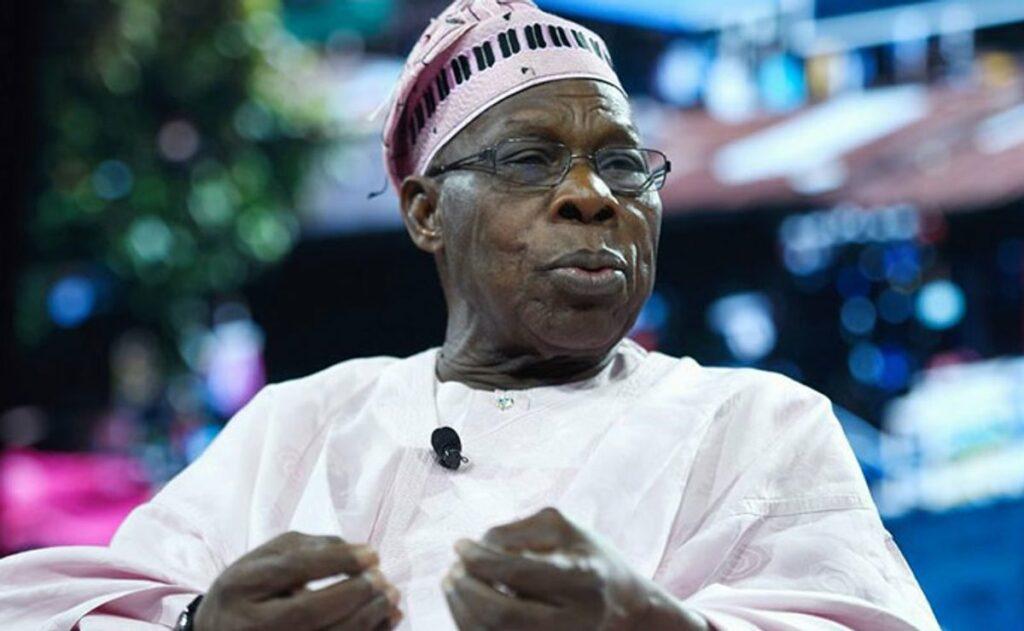What would have been a usual, dreary event, with speeches and dances and tape cutting, such as the inauguration of the Iseyin Campus of the Ladoke Akintola University in Oyo State last week Friday, has become a lightning rod of controversy because Chief Olusegun Obasanjo barked orders at some Yoruba monarchs.
It was one of the most humiliating scenes one could have witnessed and perhaps not since the colonialists divested sanctity from our traditional institutions has such a level of floor mopping been done with the once revered monarchs.
Obasanjo had been vexed by the fact that the Yoruba chiefs, including the Ooni of Ife, the spiritual head of the Yoruba people, had not stood up in deference when the governor of Oyo State, Seyi Makinde, entered the venue. Like an old sergeant major, the retired general gave the chiefs a talking down to, and then ordered them, in a tone one would reserve for an errant dog, or a disgruntled headmaster addressing naughty school pupils, asked them to stand up. He then asked them to sit down with the same tone. It was a minute or so of cringe-worthy dressing down, yet it has taken the shine from the projects they all went to inaugurate that day, which is unfortunate.
Obasanjo was right on some counts. Yes, the monarchs were constitutionally beneath the governor and, by extension, the president. Yes, the monarchs breached protocol. But was he right to humiliate them that way, especially at a public event? Since then, the former president has doubled down on his stand with a statement issued by his spokesperson. His vociferousness suggests that, upon reflection, he has no regrets.
Nothing new here. Lesser men have gotten away with more. After all, Obasanjo comes from a long tradition of public officials humiliating monarchs. Just in 2020, then governor of Rivers State, Nyemsom Wike, in typical Wike fashion, shamed a monarch in public, calling him a fake and a “small boy” who used to run errands for him.
Greater monarchies, like the Sultanate of Sokoto, had suffered such humiliations when Ibrahim Dasuki, the man sitting on the throne of an empire, was summoned to the office of Governor Yakubu Muazu and was told that he had been sacked as Sultan and had been banished. Then Muazu went on national TV with a shaky voice to announce what he had done at the behest of the head of state then, General Sani Abacha. He just didn’t mention the last part, but everyone knew.
The revered figure of Ado Bayero, the Emir of Kano, was once hounded, harassed and denigrated by the Governor of Kano, Abubakar Rimi, who in an interview, said, “The emir of Kano is nothing, nothing, nothing but a public officer,” who he could dispose and sleep peacefully at night. Bayero’s successor, Emir Muhammadu Sanusi II, was hounded out of office by the governor Abdullahi Ganduje.
This tradition of humiliating monarchs by government officials dates back to the colonial era when chiefs and emirs, like King Jaja of Ipobo, were arrested and sold into slavery, or like Oba Ovonramwen of Benin, like Malam Aliyu Abdullahi (Maisango), Emir of Bida; Malam Abubakar, Emir of Zazzau; Malam Aliyu Dansidi, Emir of Gwandu; Malam Muhammadu Aliyu, Emir of Zazzau; and Sarki Abubakar of Gumel, were all deposed and banished to die in exile. The Oba in Calabar, the emirs in Lokoja where their tombs are today. They were all replaced with more pliant monarchs. Others, like Sultan Attahiru, paid the ultimate price of being killed in battle in 1902.
The colonial administrative system and its fundamental modus operandi of indirect rule were only going to succeed if the traditional institutions were subordinated to some random British bloke who, probably out of desperation or lack of prospects in his own country, joined the colonial service and by the power of a Maxim gun, some paper with some squiggles and a stamp, presided over monarchs sitting on ancient thrones. So instead of the institutions that they were, running empires and kingdoms, the monarchs became mere appendages of the colonial administration, put on the government’s payroll to ensure their loyalty.
The succession order has been truncated and now needs a thumbs up from the colonial administrator or supervising political office holder to proceed. This again allowed impositions by the administrators and, subsequently, allowed state governors to favour their cronies and allies who may not even have claims to the throne. Take, for instance, the case of Samuel Adebayo-Adegbola, who sat on the throne of the Eleruwa of Eruwa for 21 years before a court sacked him. The reason? He was not a member of one of the two ruling houses due to produce the successor in 1994.
But worse perhaps was that for its convenience, the colonial administration fabricated chieftaincy stools where none existed, plucked pliant colonial subjects and made them kings. With independence, we have seen many monied men buying their way onto royal seats. Without an organic tradition of decorum, this birthed a plethora of misfits, treating positions of authority with levity and indiscretion and, by extension, degrading the esteem in which these institutions are held, or ought to be held.
Take for instance the Deji of Akure, Oba Oludare Adesina who did the unkingly thing of street brawling with his wife and beating her up on a very public street. The Ooni of Ife has continued to scandalise people with his much-publicised marriages, divorces, and other unsavoury scandals more befitting for the gossip pages. In 2020, the Oluwo of Iwoland, Abdulrasheed Akanbi and Agbowu of Ogbaagbaa, Dhikrulahi Akinropo, engaged in a public fisticuff, resulting in one monarch sustaining injuries and the other being suspended from office.
Few monarchs, like Ado Bayero, have rode out the irreverent tide of political radicals like Rimi and earned the respect of the people and increased the esteem of the stool they sat on. Unfortunately, that cannot be said of all monarchs.
I suppose with this scandal in Iseyin, questions about what exactly are the functions of these monarchs would resurface. They hold no real powers. Some could even be described as ceremonial props for the governors. Most, especially those fabricated by politicians, merely serve as campaign buoys for political aspirants who shower them with gifts in the hope of influencing election outcomes. Yet, often, the cause of tension between governors and monarchs is that the monarchs backed the losing candidate or did not do enough to get the governor into office.
The irony in all this is that Britain, which corrupted the traditional institution in Nigeria, is still, in effect, a monarchy. A monarchy that has for centuries now been subordinate to the democratic dictates of the country, one that has had its fair share of scandals but remains vaunted by most Brits and the state, as we saw recently during the funeral of the Queen.
The disrespect we witnessed on Friday in Iseyin—and that was what it was—will most likely repeat itself. Our colonial history, the constitution, the politicians and the monarchs themselves have all contributed to our arrival at this unsavoury place. As the Hausa people say, if rats have a propensity to steal, the locust beans tend to smell.
If the monarchs are being so disrespected, what are they doing, each one of them, to earn and retain the respect of their people and the office that they hold? But beyond this, the pertinent question remains, apart from the historical relevance and cultural aesthetic functions, how does this country benefit from this system, and why must we continue to have chiefdoms sprouting at the whims of political officeholders who compensate a group of people with an often meaningless, decorative stooge?
The problem is no one knows exactly how many monarchs there are because there seems to be one lording over every nook of the country; most are employees of the local government, not even the state. The disrespect of the monarchs should not be condoned, just as I think the monarchs need to earn their respect. In the final analysis, I think we need to review this institution and what exactly it means and should mean—if it should mean anything—to the country.

 Join Daily Trust WhatsApp Community For Quick Access To News and Happenings Around You.
Join Daily Trust WhatsApp Community For Quick Access To News and Happenings Around You.


